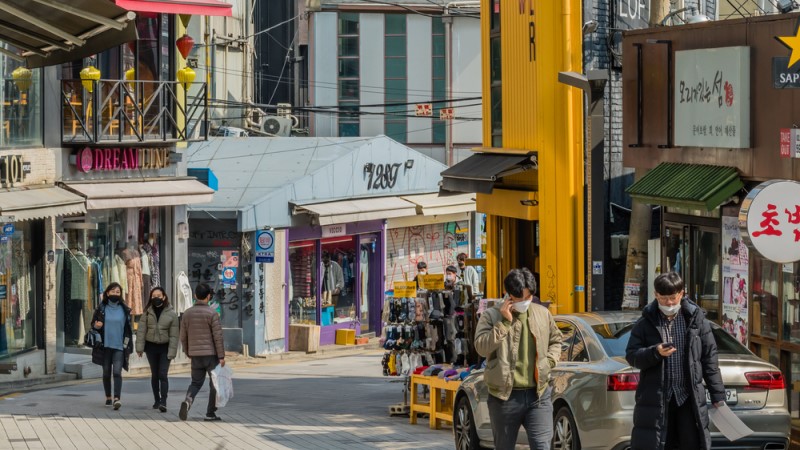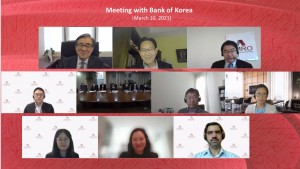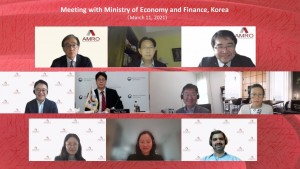
SINGAPORE, March 18, 2021 – The Korean economy was less severely affected by the pandemic than most advanced economies in 2020, thanks to targeted social distancing measures and robust global demand for electronic equipment for telework, and is expected to rebound strongly in the next two years. This is according to the preliminary assessment by the ASEAN+3 Macroeconomic Research Office (AMRO) after its Annual Consultation Visit to Korea from February 16 to March 11, 2021.
The mission was led by Lead Economist, Dr. Sumio Ishikawa, while AMRO Director, Mr. Toshinori Doi and Chief Economist, Dr. Hoe Ee Khor participated in several policy meetings. The discussions focused on the impact of the pandemic on the Korean economy and policy response in supporting recovery while maintaining stability.
Recent Development and Outlook
“After contracting by 1.0 percent in 2020, the Korean economy is expected to grow by 3.2 percent in 2021 and 3.0 percent in 2022,” said Dr. Ishikawa. “The rebound is expected to be driven by a recovery in domestic and external demand, reflecting the progressive rollout of vaccines around the world and the reopening of the global economy.”
After a sharp contraction in the second quarter of 2020, the Korean economy has been on a recovery path led by robust semiconductor exports and expanding facilities investment in the Information and Communication Technology sector. The growth momentum is poised to continue, albeit unevenly across sectors. Benefiting from global economic recovery, export-oriented manufactures have rebounded strongly since the third quarter of 2020. Face-to-face services and domestic consumption will continue to lag behind due to lingering containment measures and uncertainty in employment recovery. The growth momentum would benefit from expansionary government spending and accommodative monetary policy stance.
Risks and Vulnerabilities
Continuing concerns over the COVID-19 pandemic, possible delays in global vaccine programs, and US – China trade tension could impede the recovery of Korea’s export. The potential pandemic resurgence and high indebtedness among households can drag down domestic demand. From a longer-term perspective, the pandemic and rapid advancement of digital technology could lead to a wider income inequality between high and low-income households.
Despite ample buffers, financial institutions’ asset quality could deteriorate given a large increase in debt and the weakening financial position of the corporate sector, particularly “zombie companies”. Amid a low interest rate environment, financial imbalances have manifested in the forms of a buildup of household debt and a surge in housing and stock prices. This situation may not pose systemic risks thanks to the tightened macroprudential policies, stricter lending standards, and ample capital buffers of financial institutions. However, a sharp rise in interest rate or asset price correction may strain the financial soundness of highly-leveraged mortgage borrowers and equity investors.
Policy Responses
Amid lingering uncertainty over the pandemic and economic outlook, expansionary fiscal policy and accommodative monetary policy should be maintained to sustain the economic recovery. The current monetary policy stance is sufficiently accommodative to support the economic recovery. Meanwhile, fiscal measures should give more priority to the adversely affected groups to achieve stronger and more inclusive economic growth. From a medium-term perspective, widening fiscal deficits and a rapidly growing government debt would warrant a strong commitment to maintaining fiscal sustainability.
The authorities should tighten the monitoring of the loan quality of financial institutions to safeguard financial stability. The current macroprudential measures should remain in place to curb the build-up of financial imbalances, as the prolonged low interest rate environment has spurred risk-taking behavior. On the external front, the mission welcomes the authorities’ recent measures to strengthen the foreign currency liquidity management of non-bank financial institutions, especially securities companies.
Lastly, the mission supports the Korea New Deal initiative. The policy, which promotes an eco-friendly economy, digitalization and new growth engines, is a timely preparation for the post-pandemic period. At the same time, further structural reforms in the service sector and the labor market should be stepped up to enhance productivity and competitiveness of small firms and low-skilled labors.
AMRO’s mission team would like to express its deep appreciation to the Korean authorities and other participating organizations for their cooperation and candid exchange of views. AMRO wishes to express our appreciation for the strong support and coordination from the Korean authorities for the excellent arrangement that has made this virtual mission possible.
—
The Korean translation of this press release is also available on the website of the Ministry of Economy and Finance of Korea. In case of a discrepancy, the English original will prevail.
—

Top row (from L to R): AMRO Director Toshinori Doi, AMRO Chief Economist Hoe Ee Khor, AMRO Lead Economist Sumio Ishikawa
Middle row (from L to R): AMRO Senior Economist Jinho Choi, Bank of Korea Chaired by Deputy Governor Sangdai Ryoo, AMRO Senior Economist Yang-Hyeon Yang, AMRO Economist Diana del Rosario
Bottom row (from L to R): AMRO Researcher Chunyu Yang, AMRO Economist Wanwisa May Vorranikulkij, AMRO Financial Market Specialist Prashant Pande

Top row (from L to R): AMRO Director Toshinori Doi, AMRO Chief Economist Hoe Ee Khor, AMRO Lead Economist Sumio Ishikawa
Middle row (from L to R): AMRO Senior Economist Jinho Choi, Ministry of Economy and Finance Deputy Minister Taesik Yoon, AMRO Senior Economist Yang-Hyeon Yang, AMRO Economist Diana del Rosario
Bottom row (from L to R): AMRO Researcher Chunyu Yang, AMRO Economist Wanwisa May Vorranikulkij, AMRO Financial Market Specialist Prashant Pande
About AMRO
The ASEAN+3 Macroeconomic Research Office (AMRO) is an international organization established to contribute towards securing macroeconomic and financial stability of the ASEAN+3 region, which includes 10 members of the Association of Southeast Asian Nations (ASEAN) and China; Hong Kong, China; Japan; and Korea. AMRO’s mandate is to conduct macroeconomic surveillance, support the implementation of the regional financial arrangement, the Chiang Mai Initiative Multilateralisation (CMIM), and provide technical assistance to the members.
